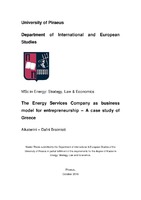| dc.description.abstractEN | The Europe 2020 strategy is the EU’s agenda for growth and jobs for the current decade. It emphasizes smart, sustainable and inclusive growth as a way to strengthen the EU economy and prepare its structure for the challenges of the next decade. Europe has set targets for different areas, such as employment, research and development (R&D), climate change and energy, education and poverty and social exclusion. The improvement of energy efficiency is one of the most significant pillars of a sustainable energy policy and a key component of climate change reduction strategies. The Energy Efficiency Directive 2012/27/EU establishes a common framework of measures to promote energy efficiency, in order to ensure the achievement of the Union 2020 target for a 20% improvement in energy efficiency.
The private sector, including energy service companies (ESCOs) can play an important role in improving energy efficiency at the market level. Energy Service Companies (ESCOs) are specialized energy companies with sufficient know-how and experience, with the necessary funds and undertaking interventions aimed at improving energy efficiency and saving energy at end-user facilities. Their value of ESCOs in unlocking the energy saving potential in the market is recognized by various EU directives and initiatives in the European context, such as the Energy Efficiency Directive (2012/27/EU; EED), which sets explicit requirements to promote the market of energy services through its Article 18.
The scope of this master thesis is to identify clearly the legislative framework of both Europe and Greece around the ESCOs and the market barriers and to consider all the possible ways of financing that exist. It analyses a case of Greece, which concerns the technical intervention of the ESCO to another company, and by selecting the Third-Party financing, the NPV and IRR indicators, that determine the profitability of the investment, are calculated. In addition, some case scenarios are considered, such as the variation of electricity price, WACC and tax rate, as they significantly identify the sustainability of investment plan. Taking into account all mentioned above, master thesis presents some conclusions and recommendations for further research on the ESCOs’ establishment, which has not been extensively developed at national level, enhancing their importance in Greek entrepreneurship and therefore in Greek economy. | el |



